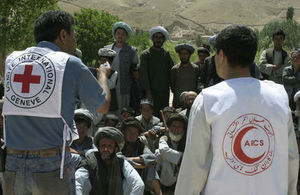World Red Cross and Red Crescent Day
The Foreign Secretary pays tribute to the ‘extraordinary contribution’ of the Red Cross and Red Crescent Movement.

International Red Cross and Red Crescent Movement workers in Afghanistan Credit: ICRC / STOESSEL, Marcel / www.icrc.org
The Foreign Secretary William Hague said:
World Red Cross and Red Crescent Day gives us a chance to recognise the extraordinary contribution that the movement makes through their humanitarian mission. I pay tribute to their tireless work, often in the most difficult and dangerous situations during war and natural disaster, providing assistance to those in need.
This year marks the 150th anniversary of the first Geneva Convention, one of the founding documents of International Humanitarian Law and the moment when states first officially recognised that there must be limits to the conduct of war in order to prevent atrocities. The work of the International Committee of the Red Cross (ICRC) as custodians of the Geneva Conventions is as vital today as it has ever been. International Humanitarian Law remains the basis for the protection of civilians in conflict and is a priority for the UK. I am pleased to announce that the FCO has published a guide to International Humanitarian Law, which includes information on the work of the Red Cross and Red Crescent.
We are particularly grateful to the ICRC for their work to strengthen responses to tackle sexual violence in conflict as this is also a priority for the UK. The Declaration Of Commitment to End Sexual Violence in Conflict, now endorsed by 148 UN Member States, reaffirms that sexual violence in conflict is a grave breach of the Geneva Conventions and their first Additional Protocol. This is a clear statement of intent to tackle horrific crimes, which for too long have been hidden by social taboos and treated as lesser offences. In June we will build on the political commitments made by states by hosting in London the Global Summit to End Sexual Violence in Conflict. This will bring together governments, civil society, international organisations and survivors in a global effort to end the use of rape and sexual violence as a tactic or weapon of war. So I am delighted that President Maurer of the ICRC will attend the Summit to speak about their work in this field.
Further information
The International Committee of the Red Cross (ICRC) was founded in 1863 in Geneva, following the publication by Henri Dunant of his eye-witness account of the horrors of the battle of Solferino. It originally provided medical care and assistance to wounded soldiers regardless of their nationality. In 1864 the first Geneva Convention was adopted by twelve states. It focused on care for wounded soldiers and protection for civilians who might treat them on the battlefield. Today the ICRC acts as the custodians of International Humanitarian Law, as enshrined principally in the four Geneva Conventions of 1949 and their additional protocols.
Independence and neutrality remain the guiding principles for the ICRC and the International Red Cross and Red Crescent Movement as a whole. They operate across the world providing humanitarian assistance and protection in conflicts and other emergency situations. More information about their work is available on the ICRC website and the British Red Cross website.
The FCO guide to International Humanitarian Law and UK policy towards the treaties and institutions through which it is implemented is available online.
The Global Summit to End Sexual Violence in Conflict will be hosted by the UK at the Excel Centre from 10-13 June. It will be open to the public and you can find more information on the Summit website, facebook and twitter @end_svc.
Follow the Foreign Secretary on twitter @WilliamJHague
Follow the Foreign Office on twitter @foreignoffice